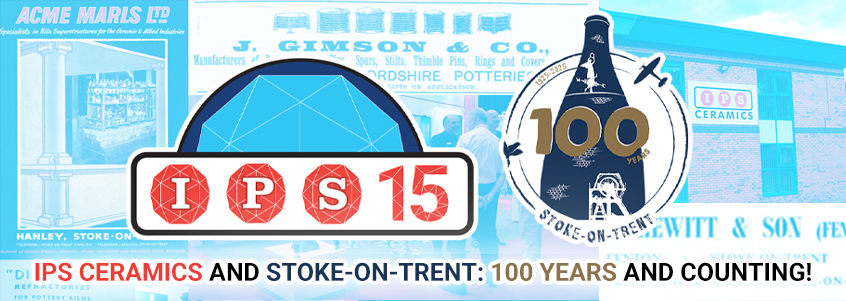2025 celebrates two anniversaries: Stoke-on-Trent’s 100th Anniversary as a city and IPS Ceramics’ 15th Anniversary as a company.
Stoke-on-Trent has been an internationally recognised ceramics manufacturing hub for centuries, to the point that it’s literally nicknamed “The Potteries”. The IPS Ceramics brand might only be 15 years old but our history can be traced back over 100 years to some of the most famous Stoke kiln furniture manufacturers of all time.
As anniversaries are often good opportunities to reflect on the past, let us look at the history of Stoke’s ceramics industry and how IPS Ceramics came out of it.
Origins
The manufacturing of pottery requires extensive use of kiln furniture. Kiln furniture is the collective name given to products designed to hold, support and transport pottery products while they’re being put through heat treatments.
In the 1800s, Stoke-on-Trent was heavily dedicated to pottery manufacturing. Most pottery manufacturers would have had their own kiln furniture departments making the saggars that their products were fired in. With industry demand for saggars this high, it led to the creation of multiple companies that were dedicated solely to manufacturing kiln furniture.
IPS Ceramics can trace its origins back to four major kiln furniture companies of the era: Hewitts, J. Gimson and Co, Diamond Clay Company, and Acme Marls. Hewitts and J Gimson were established as far back as the 1860s.
The industry was constantly changing. In the 1950s, the pottery industry moved from coal fired kilns to open-fired gas kilns, resulting in cleaner atmospheres and the ware needing less protection. This led to the invention of new, more modern kiln furniture solutions, including items such as batts and shelves (which are essentially saggars with the walls removed) and support props.
Mergers
Over time, the problem that kiln furniture companies in Stoke kept facing was that there was a large number of them in a very small area, meaning that Stoke became an extremely competitive market where companies had to work hard to ‘stand out of the crowd’ and maintain their customer bases.
The British pottery industry was also facing increased competition from overseas markets, shrinking the demand for British pottery. With the home industry much smaller than it used to be, many kiln furniture companies started to struggle. To stay afloat, they started looking for mergers and buyouts, allowing companies to share resources and customer lists while injecting more capital into themselves.
In 1962, a Sheffield based company called Dyson acquired the Diamond Clay Company. In 1995, Dyson then bought J Gimson and merged it with Diamond to make the appropriately named Diamond Gimson. In the 2000s, Dyson then acquired Acme Marls and Hewitts, combining both with Diamond Gimson to form Dyson Thermal Technologies.
Dyson
Having consolidated much of the Stoke Kiln Furniture industry under a single banner, Dyson Thermal Technologies did well for a long time. Unfortunately, then came the 2008 Financial Crash and resultant global recession, a traumatic event that negatively affected many industries and companies throughout the world.
Because of it, Dyson found itself without enough capital to maintain its kiln furniture operations. In order to save the company, Ian Wright, Phil Green and Sukhjinder Singh organised a management buyout. Needing to rebrand the company, Ian, Phil and Sukhjinder decided to name it after their initials, and so out of Dyson’s ashes, IPS Ceramics was born.
IPS-Trend
Faced with an increasingly difficult market and having inherited some unfavourable finances, IPS Ceramics had to make significant changes from how things worked during the Dyson days.
Using Ian’s relationships and contacts formed during the Dyson days, IPS set up a manufacturing partnership with the established Chinese company Beijing Trend. This partnership was beneficial to both companies: IPS could continue to manufacture the same high-quality products at a market expected cost, while Trend got the advantage of working with an established British company who could bring many technical, manufacturing and quality improvements.
To ensure that the high quality of IPS’ products was maintained, IPS transferred its production machinery, recipes and technology to Trend’s factory while providing training to the local staff. At the same time, Ian relocated to China to manage the entire plant production, oversee the integration of the IPS products, and implement new quality and production procedures. Catherine Lv was also recruited locally, initially working as Ian’s translator and soon being promoted to a much larger role as Ian’s assistant.
The Future
The relationship between IPS Ceramics and Trend has grown from strength to strength and continues to flourish, both companies sharing a joint factory that allows them to service customers worldwide.
IPS Ceramics are proud of our long history in the Potteries and are dedicated to supporting the ceramics industry throughout the world, all from our ancestral home of Stoke-on-Trent.
If you have an enquiry that you think could use a ceramic solution, please feel free to get in contact with us.
